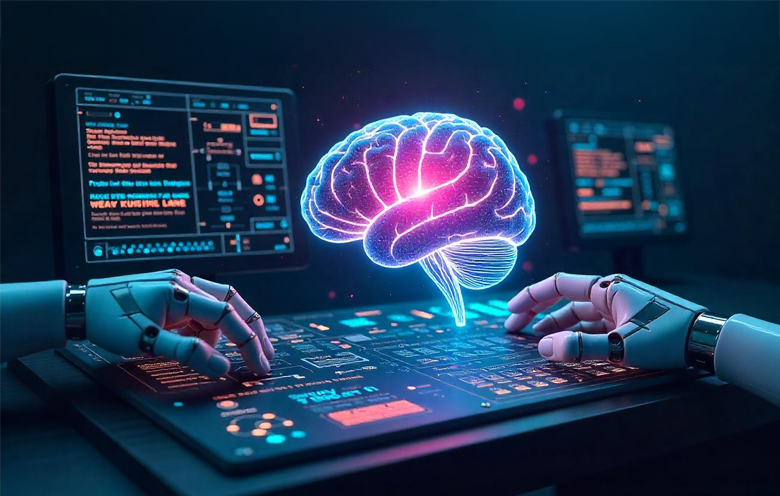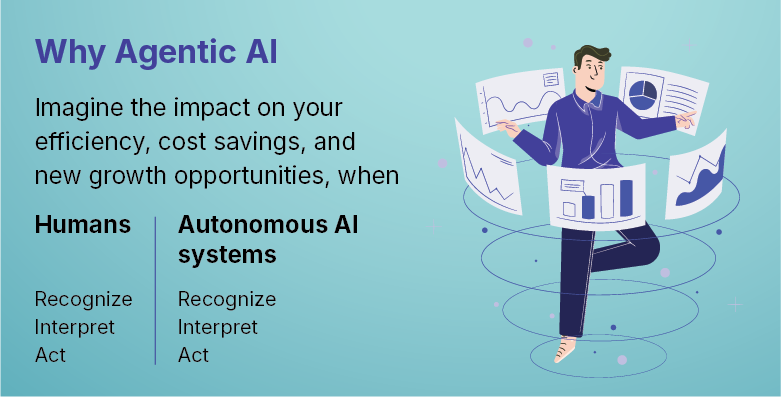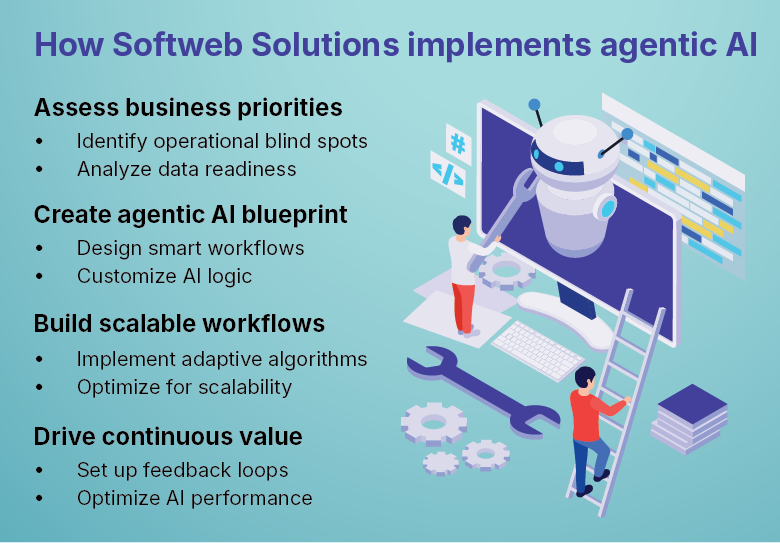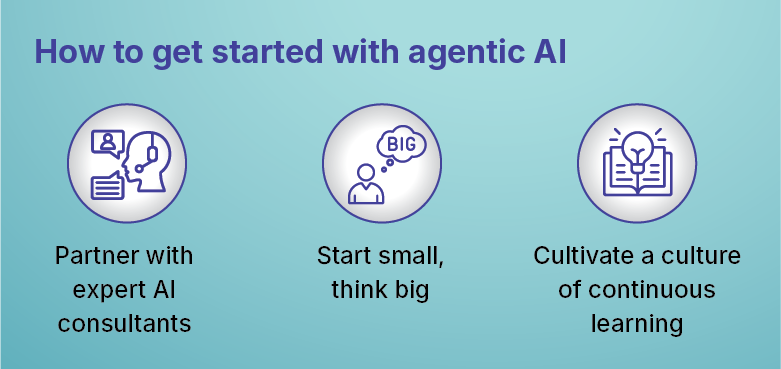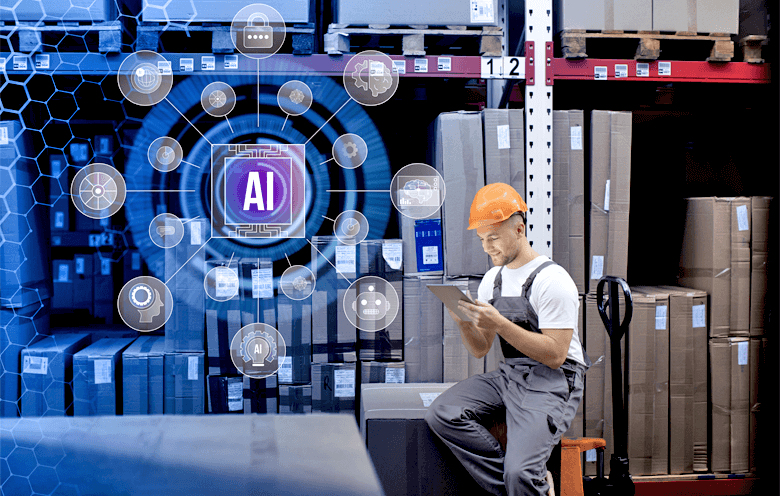Tick.
Tick.
Tick.
Before the clock ticked a third time, Muhammad Ali landed 12 punches. 12 punches in 2.8 seconds. It was a feat of unmatched speed and precision, a testament to Ali’s skill in the ring. Similarly, the development of artificial intelligent (AI) systems that can act autonomously, once thought impossible, is now a reality.
Why are we talking about AI systems that can act autonomously?
Disruptive change is not just a rare event anymore. It’s the new normal. Markets evolve overnight, technology disrupts entire industries at breakneck speeds, and what worked yesterday might not be enough to guarantee success tomorrow. Businesses face a constant challenge: How can you stay competitive when the ground keeps shifting beneath you?
The answer, however, goes beyond just ‘keeping up.’ It requires adopting a new kind of intelligence – one that does not merely react but anticipates, learns, and adapts dynamically. This is where agentic AI comes in. Unlike traditional AI, which mainly reacts to data inputs, agentic AI is proactive, autonomous, and adaptive. It does not just analyze data. It navigates the world autonomously, evolves with every change, and acts with foresight. That’s the beauty of agentic AI.
If you want to future-proof your business, it’s time to move beyond traditional AI systems. Why? You will learn about that in this blog. You will also see the three ways agentic AI can future-proof your business, the role of AI consulting in implementing agentic AI, and how to start with agentic AI.
The problem with traditional AI systems: Why can’t old tools keep up
For years, companies have relied on traditional AI systems to automate tasks, optimize processes, and analyze customer data. Undoubtedly, these systems have been valuable. However, with time, companies realized that traditional AI systems face an inherent limitation: they are built on the idea of reacting to data, not anticipating the next move. This reactive nature has become a serious constraint in a world where change accelerates with each passing day.
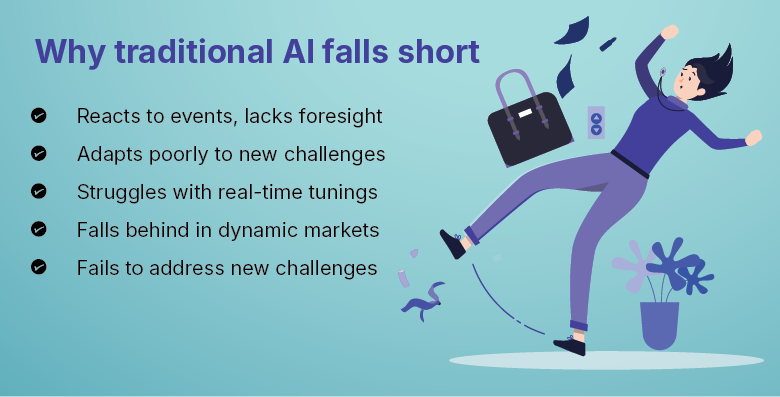
Think about it like driving a car on a long stretch of highway. Traditional AI is the cruise control – you set it, and it maintains the same speed until you need to adjust it. It’s efficient, but it cannot adapt to sudden obstacles or unforeseen changes in the road ahead.
Now, picture a self-driving car. This is Agentic AI. It does not wait for a roadblock to appear. It scans the environment continuously, makes decisions in real time, and adjusts its course based on the latest data. This level of autonomy is what businesses need to stay ahead of the curve.
Suggested: Want to know more about why agentic AI is poised to be the backbone of future business strategies? Click here!
Why agentic AI is the key to future-proofing your business
History says that businesses that have failed to adapt to the demands of the modern, fast-changing market, had overtaken by competitors. The stakes have never been higher. But it’s not just about keeping up – it’s about the speed. To do this, companies need to embrace agentic AI, an AI system that not only automate tasks but drives decisions. Let’s look at why this shift is so critical.
1. Adaptability in the face of uncertainty
In today’s world, uncertainty is not a rare event. It’s the rule. Whether it’s an economic downturn, a global pandemic, or sudden shifts in consumer behavior, disruptions have become the norm. Businesses that rely on static AI systems are at a serious disadvantage because those are essentially blind to such changes.
Agentic AI thrives in unpredictable circumstances, analyzes different scenarios, develops strategies, and executes actions to achieve specific goals with minimal human intervention – with unprecedented speed and precision.
For example, Tesla has improved its vehicles’ navigation and decision-making capabilities. These vehicles use sensors and algorithms to make immediate decisions, displaying agentic qualities.
In business terms, this means organizations no longer have to wait for a human-led decision-making process. They can act decisively and autonomously. What does that mean? The following table explains everything with real-life examples.
| Use case | Generative AI limitation | Agentic AI turnaround | Real-life example |
|---|---|---|---|
| Code generation and completion | Requires developers to validate code, fix errors, and adapt outputs manually. | Creates deployable code, reduces human input, ensures faster turnaround times. | GitLab, an AI agent, completes code, defines logic, and suggests tests. |
| Content generation, editing, and proofreading | Needs writers to guide tone, edit, and ensure audience alignment. | Creates publish-ready content, adjusting tone and style independently. | Amazon, Cisco, AT&T adopt Agentic AI to automate content pipeline. |
| Insurance operations | Relies on manual checks for underwriting, claims processing, and fraud detection. | Handles end-to-end workflows with near zero manual oversight. | A Dutch insurer automates 90% of auto claims, allowing adjusters to focus. |
| HR operations | Struggles to interpret nuanced hiring needs, requiring recruiters to refine shortlists and manage scheduling. | Offers precise candidate recommendations and automates scheduling. | PepsiCo uses ‘Hired Score’ to rank candidates by fit, cuts hiring time and improves quality. |
| Retail and e-commerce | Fails to interpret evolving market trends in real-time without extensive human input. | Analyzes trends, provides real-time inventory actions, optimizes business operations. | Zara plans to implement Agentic AI for demand-driven, autonomous supply chain. |
Table: Agentic AI vs. generative AI with real-life examples
2. Autonomous decision making: Going beyond automation
Traditional automation has value, but it still requires human oversight and manual adjustments. In fast-moving markets, human intervention simply cannot keep up with the speed at which data is generated and business conditions change.
Agentic AI eliminates this bottleneck through autonomous decision making. It does not just automate processes. It makes decisions independently. It is even a step ahead of generative AI. GenAI excels at creating, agentic AI focuses on doing.
Just like Muhammad Ali’s 12 punches in 2.8 seconds redefined what the human body accomplish, agentic AI redefines what AI systems can achieve in business. Consider the world of high-frequency trading. AI systems drive thousands of trades per second based on complex data interpretations – a pace no human could match. By autonomously responding to market data, these trading firms can stay ahead of competitors.
3. Scalability in a rapidly changing market
Scaling operations without compromising quality or responsiveness is today’s greatest business challenge. Traditional AI often struggles to scale efficiently, as businesses must manually adjust systems to fit new environments or data sources.
Agentic AI, however, scales seamlessly. As new data arrives, it recalibrates and autonomously adapts to accommodate growth. Take Amazon as an example. Through agentic AI, Amazon manages inventory, forecasts demand and optimizes logistics across a sprawling global network. This capability empowers Amazon’s “Same-Day Delivery”, which has set a new industry standard in e-commerce.
Expert AI consulting: The key to successfully implementing agentic AI
While agentic AI offers immense potential, implementing it effectively requires expertise. That’s where AI consulting comes in.
By working with AI consulting partners, companies can ensure that their agentic AI systems are aligned with immediate needs and long-term goals. These experts help pinpoint high-impact applications of agentic AI. It thus ensures every deployment maximizes value.
Contact us to know how long does it take and the cost?
Suggested: Do you want to know what makes agentic AI, agentic AI? Agentic RAG is one of the techniques that drives decision making. Learn how it enhances accuracy, scalability, and adaptability in agentic AI?
How to get started with agentic AI: Strategic recommendations
Ready to integrate agentic AI into your business? Here is how to get started:
- Partner with expert AI consultants: Partnering with consultants who understand the technology and your industry challenges is key to effective implementation.
- Start small, think big: Focus on a specific, high-impact area – like customer service or supply chain management – to pilot agentic AI and demonstrate its value.
- Cultivate a culture of continuous learning: Agentic AI thrives in environments where experimentation and learning are prioritized. Ensure your organization fosters a culture that encourages experimentation, adapts to new information, and allows AI to evolve.
Why agentic AI is non-negotiable for the future
In a world that demands constant adaptation, staying competitive requires more than just keeping up. It requires actively shaping your future. Muhammad Ali’s iconic feat – delivering 12 punches in 2.8 seconds – was a game-changer. It showcases what’s achievable when limitations are shattered. Similarly, agentic AI enables your business to overcome constraints and empower at a level that redefines industry standards like Tesla, Amazon, GitLab, a Dutch insurer, PrpsiCo, and Zara did.
By partnering with the right AI consulting services, you invest in a future where your company not only adapts but leads. Embrace agentic AI now and secure your place at the forefront of innovation and growth.
